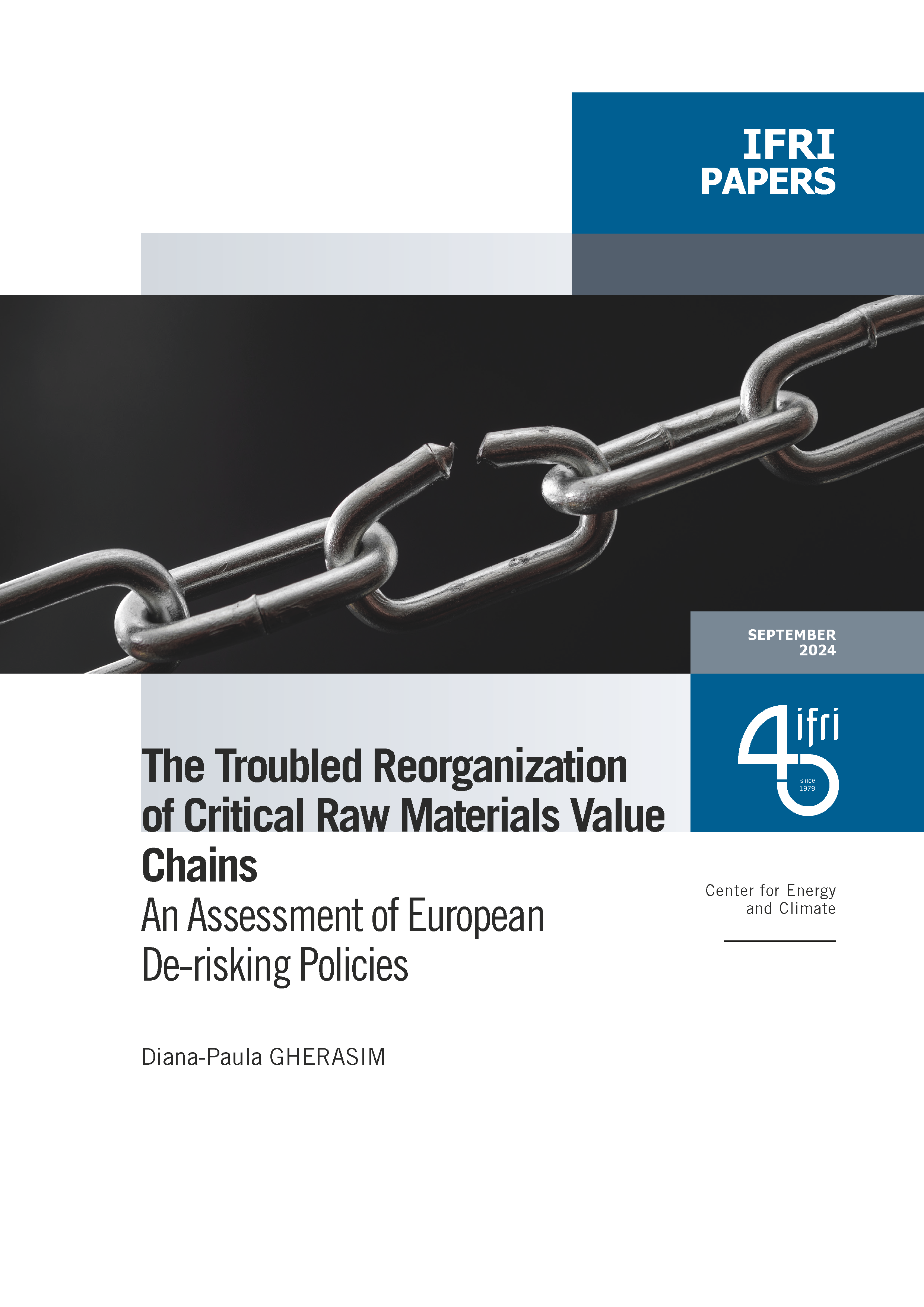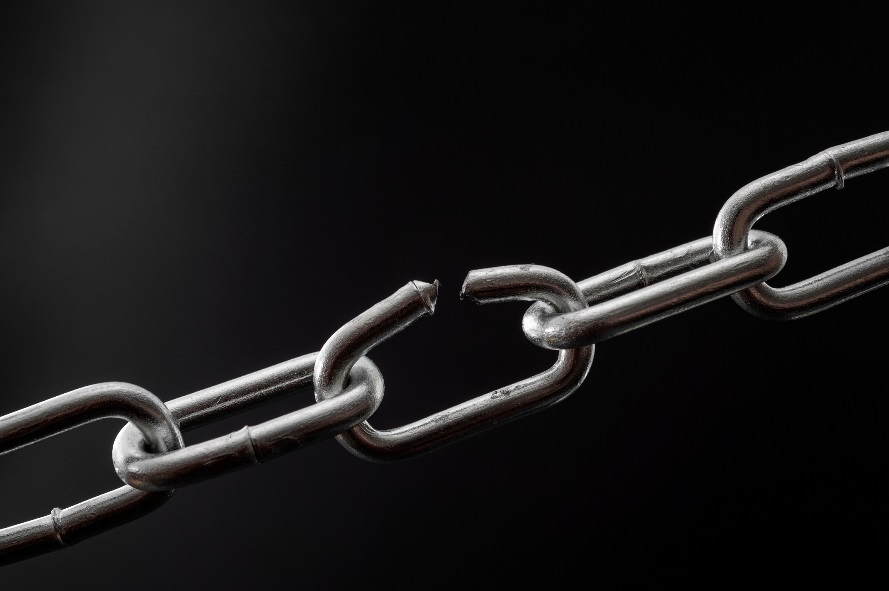The Troubled Reorganization of Critical Raw Materials Value Chains: An Assessment of European De-risking Policies

With the demand for critical raw materials set to, at a minimum, double by 2030 in the context of the current energy transition policies, the concentration of critical raw materials (CRM) supplies and, even more, of refining capacities in a handful of countries has become one of the paramount issues in international, bilateral and national discussions. China’s dominant position and successive export controls on critical raw materials (lately, germanium, gallium, rare earths processing technology, graphite, antimony) point to a trend of weaponizing critical dependencies.

National security, strategic autonomy, improving the governance and sustainability of CRM supplies are the main driving forces in the Organization for Economic Co-operation and Development (OECD) import-dependent nations for the reorganization of supply chains.
These governments have been adopting a vast array of policies with different objectives, timelines of implementation and impacts. The European Union (EU) has seriously started to address these issues through legislation in 2023 via the Critical Raw Materials Act, with some Member states like France having raised the importance of the subject some years ago. The United States (US) under Trump made the first steps in 2017 through the Executive Order 13817, followed by the release of a list of 35 critical minerals in 2018, and the Biden administration has stepped up US action on CRM supply diversification. Japan was a pioneer in 2010.
The EU and the US are developing quite similar toolboxes to push for diversification, yet substantial differences remain. The US is leaning more towards national security (ex., Foreign Entity of Concern rules) and deploying consequential funding tools for the mining and refining industries domestically but also in partner countries, notably 412 million dollars of already deployed loans and equity investments via DFC for new supplies from emerging markets. Within the framework of the Green Deal, the EU is focused on sustainability (EU Battery Regulation, Corporate Sustainable Reporting Directive, Corporate Sustainable Due Diligence Directive etc.) and on boosting its strategic autonomy by tackling dependencies and vulnerabilities (i.e., Critical Raw Materials Act – CRMA, Net Zero Industry Act – NZIA etc.) via regulation, yet so far lacking robust and long-term funding schemes and a focus on the upstream segments in non-OECD countries. In this sense, no apparent funding has been disbursed so far via the Global Gateway or European Investment Bank frameworks, yet some Member States like France, Italy and Germany have put in place their metals investment funds in the past years.
Both the EU and the US have accelerated the pace of engaging in multilateral and bilateral CRM partnerships since 2021. In addition, the EU’s Global Gateway and the US-led Partnership for Global Infrastructure and Investment are aiming at offering an alternative to the Belt and Road Initiative. Yet, to be truly effective, such initiatives must reach both speed and scale and deliver concrete positive benefits on the ground.
At the same time, Middle Eastern countries are increasingly eyeing a strong position in the CRM value chains as they are deploying strategies to diversify revenues away from fossil fuels. In developing, resource-rich countries, the trend is towards seeking to limit raw material exports to encourage processing and manufacturing locally and retain more value-added, create jobs and generate economic opportunities.
The EU’s policy and regulatory work on CRM issues has made crucial advances in the past two years, delivering a clear vision of its ambitions and needs in the light of the green and digital transition while integrating critical minerals supply chains in the overall reflections around strategic autonomy and energy security. Nevertheless, so far, few concrete impacts are noticeable outside its borders, in the absence of substantial engagement on financing projects abroad, while other players like the US, Japan or Middle East countries are more ready to engage financially and, for some of them, potentially with fewer regards towards high ESG standards. The risk for Europe is that of missing its internal benchmarks on mining, processing and recycling due to insufficient funding, public acceptance, uncertain demand, volatile prices and unclear business cases, while also not being able to materialize its strategic CRM partnerships into a resilient and secure supply base.
Titre
Key building blocks going forward for the EU’s action toward diversifying and boosting the resilience of CRM supply chains can be:
Attaching tangible benefits to the strategic projects selected by the EU Critical Raw Materials Board.
Delivering clear implementation guidelines, monitoring and verification mechanisms to enforce rules related to sustainability, circular economy and due diligence.
Prioritize cooperation with like-minded partners in the short term, explore midterm options, and build long-term partnerships.
Building partnership proposals around ecosystems of investments.
Ensuring a systematic follow-up on CRM partnerships and creating more concrete and agile opportunities for financing.
Working on convergence of transparency and sustainability criteria: include China, avoid multiplication of standards.
Boosting the circular economy, innovation and demand moderation.

Available in:
Themes and regions
ISBN / ISSN
Share
Download the full analysis
This page contains only a summary of our work. If you would like to have access to all the information from our research on the subject, you can download the full version in PDF format.
The Troubled Reorganization of Critical Raw Materials Value Chains: An Assessment of European De-risking Policies
Related centers and programs
Discover our other research centers and programsFind out more
Discover all our analysesPlacing the EU on a Warfare Footing: Energy and Raw Materials Priorities for 2026
The year 2025 has confirmed that one must prepare for much worse in the field of geopolitics and geoeconomics as the intensity and frequency of shocks increase and as the European Union (EU) has no more stable flanks now that crises with the United States (US) become so frequent and reveal a systemic rift. In the world, barriers to trade multiply and dependencies are weaponized.
Brazil One Year Away from the October 2026 General Elections
Brazil’s general elections will be held on October 4, 2026, to elect the president, vice-president, members of the National Congress, governors, deputy governors and state legislative assemblies. For the presidential and gubernatorial elections, a second round will be held on October 25 if no candidate obtains a majority of the votes in the first round.
COP30: An Inflection Point for Climate Action and Governance
The 30th Conference of the Parties (COP30), opening in Belém, Brazil, on November 10th 2025, convenes at a perilous moment.
The Strategic Dimension of Skills in the Clean Industrial Deal
In the competitiveness and energy transition battles, the European Union (EU) must master a determinant factor: skills.











